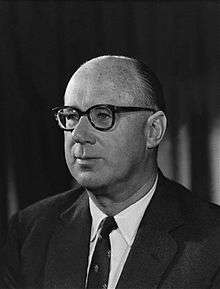John James Cowperthwaite
| The Honourable Sir John James Cowperthwaite KBE, CMG | |
|---|---|
 | |
| Financial Secretary of Hong Kong | |
|
In office 17 April 1961 – 30 June 1971 | |
| Governor |
Sir Robert Black Sir David Trench |
| Preceded by | Arthur Grenfell Clarke |
| Succeeded by | Charles Philip Haddon-Cave |
| Personal details | |
| Born |
25 April 1915 Edinburgh, Scotland, United Kingdom |
| Died |
21 January 2006 (aged 90) Ninewells Hospital, Dundee, Scotland, United Kingdom |
| Spouse(s) | Sheila Mary Thomson |
| Children | John James Hamish Cowperthwaite |
| Alma mater |
Merchiston Castle School St Andrews University Christ's College, Cambridge |
Sir John James Cowperthwaite, KBE, CMG (Chinese: 郭伯偉爵士; 25 April 1915 – 21 January 2006), was a British civil servant and the Financial Secretary of Hong Kong from 1961 to 1971. His introduction of free market economic policies are widely credited with turning postwar Hong Kong into a thriving global financial centre.
Early years
Cowperthwaite attended Merchiston Castle School in Edinburgh, Scotland, and later studied classics at St Andrews University and Christ's College, Cambridge.[1] He joined the British Colonial Administrative Service in Hong Kong in 1941, but left briefly during World War II to a posting in Sierra Leone.[1]
Hong Kong
He returned to Hong Kong in 1945 and continued to rise through the ranks. He was asked to find ways in which the government could boost post-war economic outlook but found the economy was recovering swiftly without any government intervention.[1] He took the lesson to heart and positive non-interventionism became the focus of his economic policy as Financial Secretary.[1] He refused to collect economic statistics to avoid officials meddling in the economy.[2] According to Catherine R. Schenk, Cowperthwaite's policies helped it to develop from one of the poorest places on earth to one of the wealthiest and most prosperous: "Low taxes, lax employment laws, absence of government debt, and free trade are all pillars of the Hong Kong experience of economic development."[3] The Economic Freedom of the World 2015 Report ranks Hong Kong as both the freest economy in the world, a distinction it has held since this index began ranking countries in 1975, and among the most prosperous.[4]
Throughout the 1960s, Cowperthwaite refused to implement free universal primary education, contributing to relatively high illiteracy rates in today's older generation. Compulsory education was only introduced under the governorship of Sir Murray MacLehose the next decade.[5] At a time when Hong Kong's roads were crippled by traffic congestion, Cowperthwaite also steadfastly opposed construction of the Mass Transit Railway, a costly undertaking which was nevertheless built following his retirement.[6] It would later become one of the world's most heavily utilised (and profitable) railways.
In 1960, he was appointed as an Officer of the Most Excellent Order of the British Empire (OBE)[7] and, in 1964, a Companion of the Most Distinguished Order of Saint Michael and Saint George (CMG).[8] He later became a Knight Commander of the Most Excellent Order of the British Empire (KBE) in 1968.[9] He was highly praised by Nobel laureate Milton Friedman just before his death.[1][2]
Commentators have credited his management of the economy of Hong Kong as a leading example of how small government encourages growth.[10][11]
Post–civil service career
After leaving his retirement, he was international adviser to Jardine Fleming, the Hong Kong-based investment bank until 1981. He retired and left Hong Kong for St Andrews, Scotland and became a member of the Royal and Ancient Golf Club of St Andrews.
Personal life and death
He married Sheila Thomson in 1941, they had one son. He died in Scotland on 21 January 2006, aged 90; his son predeceased him.
References
- 1 2 3 4 5 Lawrence Reed, The Man Behind the Hong Kong Miracle, The Freeman, February 10, 2014
- 1 2 The Hong Kong Experiment | Hoover Institution
- ↑ Economic History of Hong Kong, Catherine R. Schenk, University of Glasgow, Economic History Association
- ↑ Economic Freedom of the World, 2015 Annual Report
- ↑ Writers blocked, Jason Wordie, South China Morning Post, 24 June 2012
- ↑ Moving Millions: The Commercial Success and Political Controversies of Hong Kong's Railway, Rikkie Yeung, Hong Kong University Press, 2008 page 69
- ↑ The London Gazette: (Supplement) no. 41909. p. 24. 29 December 1959.
- ↑ The London Gazette: (Supplement) no. 43200. p. 4. 31 December 1963.
- ↑ The London Gazette: (Supplement) no. 44600. p. 6317. 31 May 1968.
- ↑ Durkin, Martin (2010). "Britain's Trillion-Pound Horror Story". 1. Episode 1. Channel 4. Retrieved 26 September 2014.
- ↑ O'Rourke, Patrick J. (25 August 2000). Eat the Rich (1st in paperback ed.). Avalon Travel. ISBN 978-0-87113-760-9.
External links
| Wikiquote has quotations related to: John James Cowperthwaite |
- Britain's Trillion Pound Horror Story · Watch on 4OD · Play on 4OD Player
- Tribute to John James Cowperthwaite by The Lion Rock Institute of Hong Kong
- Sir John Cowperthwaite obituary from the Daily Telegraph
- Sir John Cowperthwaite obituary from The Guardian
- Hong Kong's Nightwatchman by Tim Worstall
- The Hong Kong Experiment by Milton Friedman
| Government offices | ||
|---|---|---|
| Preceded by Arthur Grenfell Clarke |
Financial Secretary of Hong Kong 1961–1971 |
Succeeded by Sir Charles Philip Haddon-Cave |